|
Magic and his Family
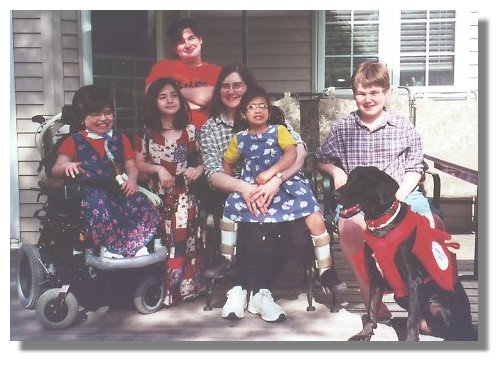
In 2001, we took on the challenge of training a service dog for a remarkable couple who are raising five disabled children. They had two boys born with developmental disabilities, one who had to live on continuous oxygen for the first eight years, the other who grew up functionally deaf as his brain could not comprehend the spoken word in his early years. The couple, a doctor and his wife, subsequently adopted three girls in infancy with spina bifida, shunted hydrocephalus and other serious health problems.
We learned from the application process that Becky, age seven, was the most severely disabled. She was paralyzed from the waist down, weak from a stroke, tube fed, cathed and on a ventilator 24/7 to help her breathe. She had been through 40 operations in her young life and, like her sisters, faced many more. Rachel, age seven, walked with the aid of leg braces, as did Stephanie, age four, although the older Rachel gets, the harder it is for her to ambulate. Noah, age fifteen, had a form of autism called Asperger's Syndrome, which made it difficult for him to relate to peers, plus asthma and allergies often kept him housebound. Adam, age twelve, had made significant progress in overcoming his learning disability and he was trying to mainstream in a public school.
After screening a number of potential candidates, it was a handsome black Lab mix from the Michigan Humane Society who proved to be the most promising match. We called him "Magic" for he enchanted everyone who met him with his gentle loving ways.
We let the parents know we'd place a dog with the family as an Assisted Skills Service Dog. That meant the mother would be in change of his care and emotional well being. She would learn everything there is to know about how to handle a highly trained service dog, then help Becky and the others to work with him as best they could.
Discussions by phone, e-mail and our viewing of a requested video tape of the children going through daily life activities yielded an ambitious list of tasks. By mutual consent, some of the proposed tasks for Rachel and Becky were experimental only, since we had no way to predict the extent to which our service dog would work with the children independent of the mother's presence after placement.
Certain tasks we taught Magic were to assist the mother with her caregiver role. Especially welcome was his ability while in harness to pull open and hold ajar heavy commercial doors so the mother could get her three daughters in three wheelchairs in and out of medical office buildings for appointments without an exhausting struggle. Another one she appreciates is Magic's enthusiastic retrieval of the portable phone, bringing it to any room in the two story house so she may call for help in a medical emergency. A third task she rated highly had to wait until after placement until it came to fruition. After a number of practice sessions over the summer, the mother happily reported that any of the five children could send Magic to "go find Mom" and he would lead her back to the specific child who needed her help, whether upstairs or downstairs.
Public access manners were also a priority. Becky's neurosurgeons in Buffalo, New York, let it be known that Magic would be welcome in the ICU after her surgeries. The teacher invited the mother to visit the classroom with Magic as soon as he arrived, hoping he'd act as a social "ice breaker", his presence encouraging other kids to interact with Becky, who was painfully shy. Her classmates unfortunately were intimidated by the sight of Becky's ventilator, blood pressure reading machine and other equipment hooked onto her big electric wheelchair, as were many adults. To enhance Magic's social facilitator role, we taught Magic to shake hands, balance a milkbone on his nose, catch treats in mid air and pick up a pen or a dime in front of a small gathering of children and adults. This has bolstered the efforts of the teacher and mother to foster positive social interactions and help Becky get over her shyness.
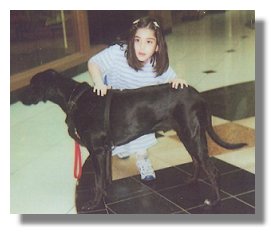 During team training in 2002, we soon discovered Rachel, at the age of eight, was a whiz kid as a service dog handler. She was able to get Magic to respond to all of her commands when he pulled the wheelchair, while mom facilitated this task, walking alongside with a second leash on the dog to ensure that he did not go faster than a child could manage. However, Rachel did not need Mom to hold the leash when Magic provided balance support while walking and when she fell down. She achieved independent control over him, with our instructor's coaching. This led to the thrill of being able to go for a walk around the block by herself for the first time in her life. Her main problem is that whenever she falls, while in leg braces, she cannot get up unaided. However, through teamwork with Magic, at home and in public, she no longer needs assistance from an adult to regain her feet after falls that occur when fatigue weakens her muscles. She can even manage to get up the hills at the zoo with Magic's help, her mother later told us in one of the post grad monthly progress reports. During team training in 2002, we soon discovered Rachel, at the age of eight, was a whiz kid as a service dog handler. She was able to get Magic to respond to all of her commands when he pulled the wheelchair, while mom facilitated this task, walking alongside with a second leash on the dog to ensure that he did not go faster than a child could manage. However, Rachel did not need Mom to hold the leash when Magic provided balance support while walking and when she fell down. She achieved independent control over him, with our instructor's coaching. This led to the thrill of being able to go for a walk around the block by herself for the first time in her life. Her main problem is that whenever she falls, while in leg braces, she cannot get up unaided. However, through teamwork with Magic, at home and in public, she no longer needs assistance from an adult to regain her feet after falls that occur when fatigue weakens her muscles. She can even manage to get up the hills at the zoo with Magic's help, her mother later told us in one of the post grad monthly progress reports.
Magic was trained to bring his food dish to Becky, pick up dropped items and carry items from any adult to Becky on command, delivering them by placing his front paws on the front bumper of her electric wheelchair so he'd be close enough to enable her to take the object out of his mouth without difficulty. At the parents' request, we also tried teaching Magic to assist Becky when her ventilator air hoses became accidentally detached from her trache tube. They'd fall to the floor, out of her reach. This calamity can occur fairly frequently with an active, fun loving child who sometimes forgets to be careful.
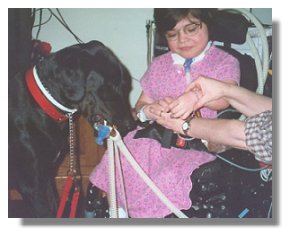 During the first week of team training in Michigan, we learned we needed to work with an actual ventilator, not just a set of hoses, due to the differences. With the ventilator turned on, there would be air puffing out of the plastic apparatus that Magic was supposed to pick up off the floor, plus an alarm beeping while he was working. We spent another six weeks preparing Magic for his new duties, then took him to New York to finish the team training. After weeks of exposure to a rented ventilator puffing away in the trainer's living room and many sessions with the alarm going off, Magic mastered the task. Becky however, needed more practice on hand signals and on rewarding the dog to let him know he'd done well. Her mother continued to work with Becky after the second week of team training, and one year later, reported Magic now responds as she'd hoped for, beating the parents to Becky's wheelchair whenever the alarm goes off to return the ventilator hoses to the child. Becky is able to reconnect the plastic apparatus at the end of the three air hoses to the trache tube, quite an achievement for someone so young. We are proud that Magic and Becky have pioneered the way for other children and adults on ventilators to work with a service dog to become more self sufficient. During the first week of team training in Michigan, we learned we needed to work with an actual ventilator, not just a set of hoses, due to the differences. With the ventilator turned on, there would be air puffing out of the plastic apparatus that Magic was supposed to pick up off the floor, plus an alarm beeping while he was working. We spent another six weeks preparing Magic for his new duties, then took him to New York to finish the team training. After weeks of exposure to a rented ventilator puffing away in the trainer's living room and many sessions with the alarm going off, Magic mastered the task. Becky however, needed more practice on hand signals and on rewarding the dog to let him know he'd done well. Her mother continued to work with Becky after the second week of team training, and one year later, reported Magic now responds as she'd hoped for, beating the parents to Becky's wheelchair whenever the alarm goes off to return the ventilator hoses to the child. Becky is able to reconnect the plastic apparatus at the end of the three air hoses to the trache tube, quite an achievement for someone so young. We are proud that Magic and Becky have pioneered the way for other children and adults on ventilators to work with a service dog to become more self sufficient.
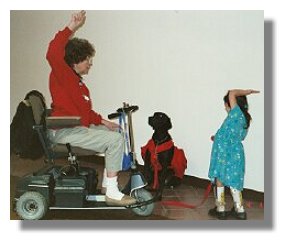 While the role Magic plays in the lives of Noah, Adam and little Stephanie is more therapeutic than task driven, all of the children acquired dog handling skills during team training. Our Samoyed demo dog, "Professor Dakota", was a big help to the instructors and children during this process. Each child was eventually assigned three service dog tasks or commands. They were asked to practice them several times a week to help Mom keep up Magic's skills, like opening the heaving sliding glass door to the deck for Becky, shutting the dishwasher for her, or jumping up to close the front door on command. It proved to be a fun way to help them achieve a working rapport with Magic. While the role Magic plays in the lives of Noah, Adam and little Stephanie is more therapeutic than task driven, all of the children acquired dog handling skills during team training. Our Samoyed demo dog, "Professor Dakota", was a big help to the instructors and children during this process. Each child was eventually assigned three service dog tasks or commands. They were asked to practice them several times a week to help Mom keep up Magic's skills, like opening the heaving sliding glass door to the deck for Becky, shutting the dishwasher for her, or jumping up to close the front door on command. It proved to be a fun way to help them achieve a working rapport with Magic.
You might think 5 kids is a bit much, but not to a dog with Magic's energy and desire to please. The mother reports he sometimes brings her the phone without being asked, a sign that he's bored and needs more to do. At such times, she asks the children to oblige with a practice session, for like all service dogs, Magic thrives on earning rewards and feeling appreciated. He also loves outings, so they take him everywhere. From Sea World to school concerts to long vigils in the ICU in Buffalo, Magic has become an integral part of the children's lives.
This placement has certainly broadened our horizons about the potential handling abilities of disabled children and the loving capacity of a service dog's heart.
The children's mother added the following comments in August 2003:
I cannot thank all the people at Sterling Service Dogs enough for helping us with our goals for a service dog. It was a tall order to get one dog to work with everyone in the family at different levels and we were turned down by several other organizations. But Joan saw the potential and the challenge and it has been a tremendously successful endeavor. Magic has enriched all of our lives. Especially for the children, I cannot imagine life without Magic. Noah has much more confidence now and has been able to take Magic to school on occasion which has helped his peer interactions and his confidence. He takes great pride in helping care for Magic. For Becky, Magic is indeed magical. For the first time, she goes out in public and is now the kid with the neat dog rather than the poor kid in the chair. Becky can count on Magic to pick things up for her and doesn't have to rely so much on the adults in her life. Stephanie has had a hard time with her epilepsy, but Magic is always there to smooth the way and is very comforting. Rachel is a champ with handling Magic and it is exciting to see how quickly he can change his pace and direction to match whoever is handling him. Adam has learned that Magic is a wonderful listener too and Magic gives him the confidence he needs to be at home independently when necessary. Magic has made life easier for my husband and myself too. His ability to help us get the kids into places like the mall and his quiet, relaxing ways help lend calm to our house. He's always there to lend a paw!
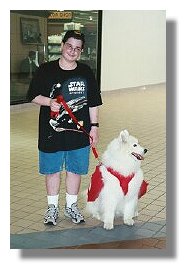 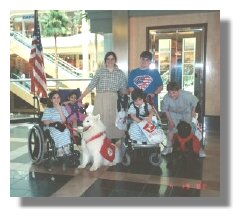 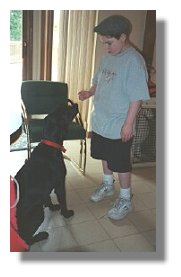
|